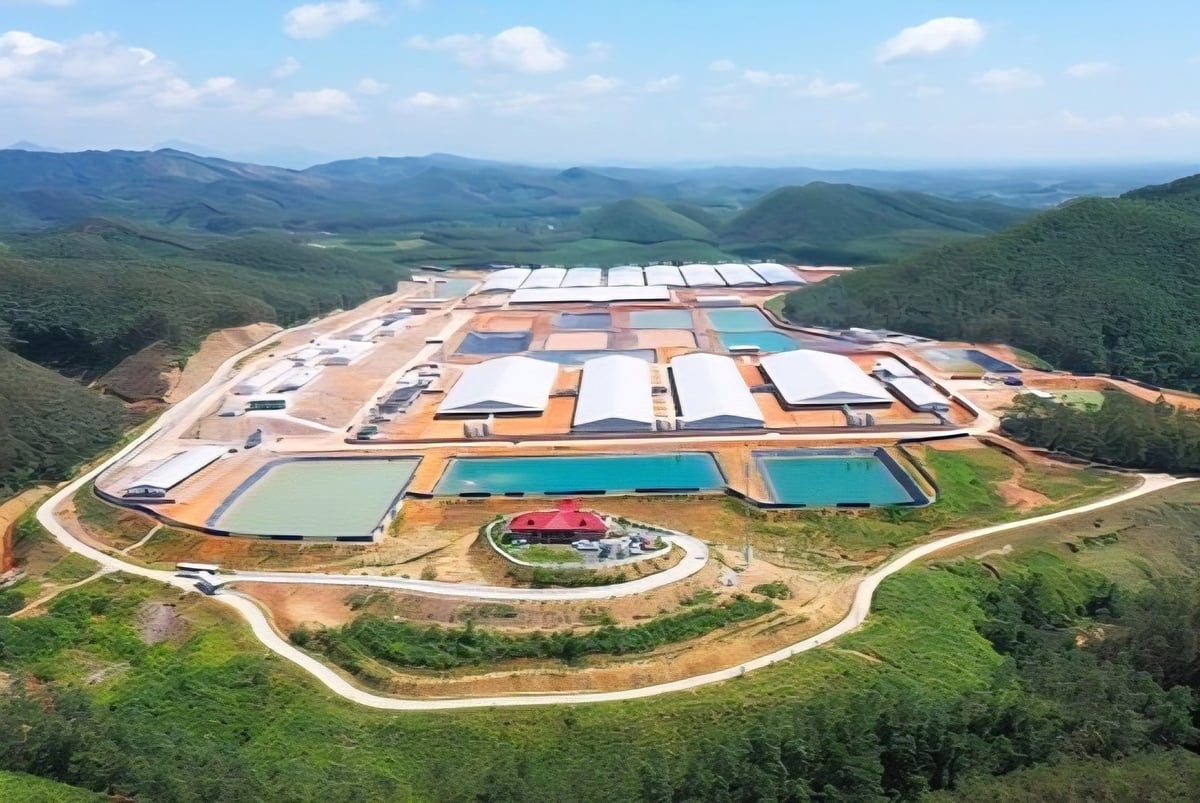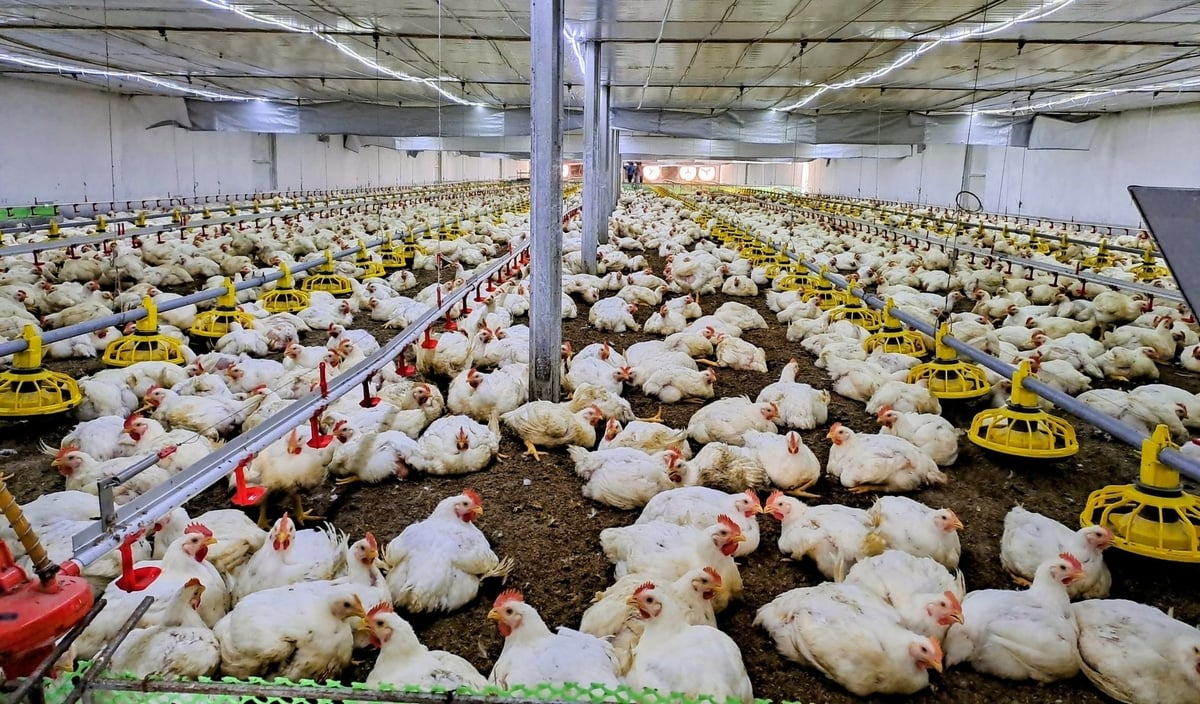November 8, 2025 | 15:02 GMT +7
November 8, 2025 | 15:02 GMT +7
Hotline: 0913.378.918
November 8, 2025 | 15:02 GMT +7
Hotline: 0913.378.918
According to statistics from the Sub-Department of Livestock Production and Animal Health (under the Department of Agriculture and Environment of Quang Ninh), as of the end of June 2025, the total number of livestock and poultry in the province was estimated at over 5.9 million, an increase of 26% compared to the same period last year. The total output of live meat sold for slaughter reached nearly 49,000 tons, up 3% year-on-year and 1.7% higher than the target set in the six-month progress report.

The modern green farm cluster “Hai Ha High-tech pig farming” (Hai Ha Farm), located in the former Hai Ha district, Quang Ninh province. Photo: Cuong Vu.
Disease prevention and control efforts have been strictly implemented, especially for dangerous diseases such as African swine fever, avian influenza, foot-and-mouth disease, and lumpy skin disease. Many farms have adopted closed housing systems, IoT technology, and automation in livestock management and care. Support policies for loans and technical assistance continue to be implemented, helping the livestock sector recover quickly from natural disasters and epidemics.
However, leaders of the Sub‑Department of Livestock Production and Animal Health acknowledged that many difficulties and challenges remain to be addressed in the second half of the year. For example, household farming still accounts for 96% of total livestock production in the province. Most of these smallholders lack waste treatment systems, causing rural environmental pollution. Their small-scale operations, lack of animal declarations, and incomplete vaccinations complicate disease control efforts.
In addition, the weakening of the commune-level veterinary network, which has been adversely affected by recent administrative restructuring under the two-tier local government model, compounds these difficulties. This has resulted in a shortage of qualified animal health officers at the grassroots level, slowing down disease surveillance and response efforts.
At the same time, rising input costs are putting pressure on producers. Prices of poultry breeding stock have increased by 10–15%, while electricity tariffs have also risen by around 5%
Meanwhile, output prices for meat products remain unstable, profit margins are low, and farmers are increasingly hesitant to reinvest or expand their herds. Risks from climate-related disasters and disease outbreaks remain ever-present, threatening to cause sudden and significant losses. Additionally, the province’s slaughtering and processing infrastructure remains incomplete, linkages between actors in the livestock value chain are weak, and market access for livestock products is still limited and uncertain.

Mr. Doan Van Chien’s chicken farm (Tap Doan hamlet, Yen Tu ward) is operated using modern cold-house technology, one of the most advanced poultry farming methods today. Photo: Cuong Vu.
Ms. Chu Thi Thu Thuy, Director of the Sub-Department of Livestock Production and Animal Health of Quang Ninh, stated that in order to meet the province’s 2025 GRDP growth target, which includes reaching over 5.8 million livestock and poultry and producing 103,000 tons of live-weight meat, the province’s livestock sector will focus on implementing a series of key tasks and solutions in the second half of the year.
The first priority is strengthening the management of smallholder livestock farming and enhancing disease control. The Sub-Department will coordinate with local officials to encourage farmers to declare their herds and ensure complete vaccination. Technical support will be provided to improve waste treatment and protect the rural environment. Disease surveillance and inspection will be intensified to prevent the risks posed by unregulated, spontaneous livestock farming. Regular vaccination campaigns will be carried out, along with veterinary hygiene checks at slaughtering facilities to ensure food safety in the livestock supply chain.
To help stabilize input costs and support production and market access, the Department of Agriculture and Environment, together with relevant sectors and local authorities, will propose support for farmers to access high-quality breeding stock and preferential loan policies, easing cost pressures on small-scale producers. The province also plans to coordinate with large enterprises and farms to align production plans, address bottlenecks in animal quarantine procedures, and expand access to consumer markets. At the same time, efforts will be stepped up to attract investment and develop infrastructure for slaughtering and processing.
“The agriculture sector will continue to advise the Provincial People's Committee to direct local authorities to allocate land and encourage investors to develop industrial-scale, concentrated farming operations that produce high-quality, safe livestock products,” said Ms. Thuy.
With timely and coordinated solutions, Quang Ninh's livestock sector is aiming for sustainable development, contributing to food security and improving the livelihoods of local residents.
Currently, the province has 26 enterprises, 24 cooperatives, and 240 livestock farms certified as farm-based economic entities. Additionally, 28 establishments have received VietGAP certification, and 15 have been certified for disease safety. Some large livestock enterprises have begun making methodical investments, such as Phu Lam Co., Ltd. and Thien Thuan Tuong Mining Joint Stock Company.
Translated by Phuong Linh

(VAN) Vinh Long is applicating IoT and AI in agriculture to enhance productivity, reduce costs, increase farmers’ incomes toward modern and sustainable production.
/2025/11/07/0913-0-160253_450.jpg)
(VAN) Minister Tran Duc Thang called on FDI enterprises to strengthen linkages, promote green growth, and share benefits with Viet Nam.

(VAN) Vinamilk makes a notable impression at the Asian Technology Excellence Awards 2025 with two pioneering technologies in milk production.

(VAN) Vinachem reviews its 2021–2025 science, technology, and digital transformation progress, and share its vision for the 2026 - 2030 period.

(VAN) Scientists and policymakers say biotechnology, digital transformation, and organic farming are key to helping Vietnam’s coconut industry adapt to climate change and enhance sustainable export value.

(VAN) Combined with fierce competition from other coconut-producing countries and limited adoption of modern techniques, the Mekong Delta’s coconut sector faces an urgent need for transformation.
/2025/11/05/3030-3-092207_368.jpg)
(VAN) Can Tho has advantages to become the regional hub for diversified fisheries development, gradually establishing a sustainable value chain linked to deep processing and export.